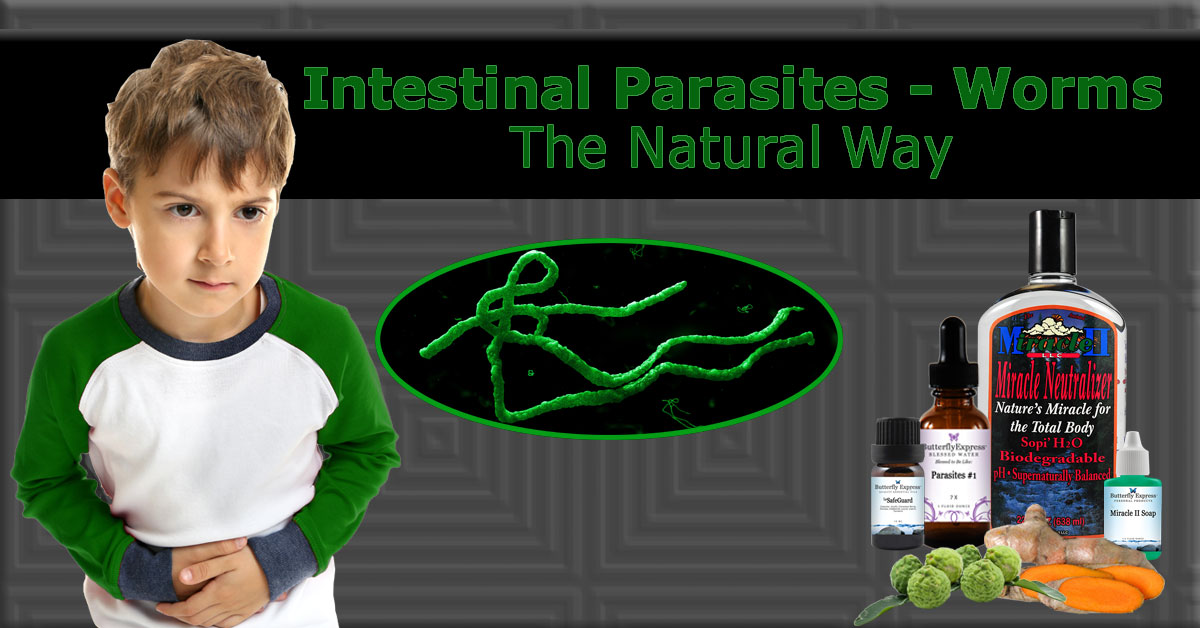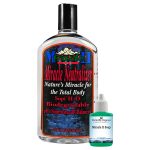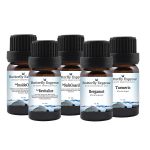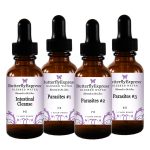Intestinal Parasites – Worms

Intestinal Parasites – Worms
By Sharon Moran & Valaree Sharp
The human intestinal tract plays host to an enormous variety of bacteria, fungi and various other organisms. Most of these are harmless – some are even beneficial. Other not-so-welcome invaders that can take up residence are called intestinal parasites or parasitic worms. These are commonly known as tapeworms, pin-worms, hookworms, roundworms and parasites. They are transmitted in their egg form through contact with infected feces, contaminated soil, food and water.
Adult worms come from eggs present in the stool of humans and animals. Worms can contaminate the soil or water. People who eat with soil contaminated hands or by eating raw, unwashed vegetables, can be infected with parasitic worms or their eggs. Under cooking infected meat is another source of intestinal worms. Children playing in sandboxes contaminated with pets’ feces and walking around outside barefoot is another way for intestinal parasites to find a way into the human host.
Certain parameters make a person more susceptible to intestinal worms. Some of these are: international travel (especially to countries with poor hygiene), poor personal hygiene habits, age (children and the elderly are more likely to become infested), having a weakened immune system (HIV/AIDS) and swimming in recreational water. Once ingested, the eggs generally grow to maturity in the intestinal tract. These parasites can be as small as a few millimeters or as large as several meters in length. They thrive consuming the bowel content or by sucking the blood from the host’s intestinal wall. Documentation of the life span of some of these worms is up to 20 years. Parasites can live in the intestinal tract for years without causing any symptoms of imbalance in the host. If the parasitic infestation begins to unbalance the host a myriad of problems can occur.
Parastic problems may include:
- Abdominal /Stomach pain
- Diarrhea/dysentery
- Nausea/vomiting
- Gas/bloating
- Rash or itching around the rectum or vulva
- Feeling tired
- Weight loss
- Passing a worm in the stool
Nutritional habits which can limit the growth of these parasites include:
- Avoiding simple carbohydrates and sugars.
- Eating more raw garlic, pumpkin seeds, pomegranates, beets and carrots.
- Adding more fiber to the diet to avoid constipation and to keep the intestinal tract moving.
- Probiotics are useful to keep the intestinal tract healthy and to create an unfriendly environment for parasites.
- Drinking plenty of water to flush the system.
- Digestive enzymes such as papain are beneficial in keeping the digestive tract healthy.
- Supporting the immune system, specifically with vitamin C and zinc, is beneficial in keeping the body healthy and resistant to infestation.
Generally speaking, herbal remedies for intestinal cleansing are fairly toxic. Herbs and herbal remedies for treating intestinal worms include – garlic, barberry, goldenseal, Oregon grape, anise seed, wormwood, black walnuts, curled mint, and olive leaf. All of these have been used historically to cleanse intestinal parasites. It is the berberine in these herbs which is helpful to rid the intestinal tract of the unwanted worms.
Miracle II
Butterfly Miracles with Herbal Remedies, by LaRee Westover, talks about parasites and how to do a cleanse correctly. The developers of the Miracle II products have a parasite cleanse protocol using both the Miracle II neutralizer and the Miracle II soap. This cleanse is gentle on the system. It creates a “soapy, slippery” environment within the intestinal tract expelling the parasites. Resting and repeating the protocol several times allows for the cleansing of both worms and eggs.
Instructions: Mix 1 ounce of neutralizer with 1 – 3 drops of soap and drink. Repeat this process once a day for 4 days. Chocolate milk hides the taste the best. After 4 days, stop and wait for 2 days. After the 2 day waiting period, resume the neutralizer/soap protocol for 4 more days. This process takes 10 days.
Essential Oils
Below are some of my favorite oils for digestive problems relating to parasites.
LeInsideOut improves the function of the digestive system. LeInsideOut has been useful in the treatment of parasites in animals and humans. For humans, place LeInsideOut with a carrier oil on the feet and massage across abdomen. For animals, dilute a few drops in water and massage into soft tissues.
LeRevitalize is a good digestive aid. Particularly in eliminating bloating, belching, and heartburn. LeRevitalize should be applied over the abdomen, either massaged or applied in a compress, for parasites. A compress or direct application over the gallbladder or kidneys can relieve distress and pain in these areas. This is an excellent oil for lymphatic congestion and immune stimulation.
LeSafeGuard tones and strengthens the digestive system. This creates an environment that is hostile and unfriendly to parasites and, thus, encourages their expulsion from the body. Herbal parasite cleanses are typically harsh and require considerable rebuilding of the intestinal tract. Essential oils seem to be able to accomplish the killing off and expulsion of parasites more gently and can actually strengthen the intestinal tract and the liver at the same time.
Bergamot In Italy, bergamot is commonly used in the treatment of intestinal parasites, and is also used in treatments for candida overgrowth and thrush. Like all essential oils, bergamot is antimicrobial, particularly to bacteria that lives in the mouth. Dilute bergamot well. Well diluted bergamot becomes soothing. However when not diluted sufficiently, it can be irritating to skin.
Turmeric is one of the great parasite herbs. It is also an anti-inflammatory. Turmeric is a strong antioxidant, helping protect the body from free radical damage. Use with a carrier oil. Pregnant women should avoid it, as it can cause uterine contractions.
Blessed Waters
Butterfly Miracles with Homeopathic Remedies II by LaRee Westover lists several blessed waters for parasites.
Intestinal Cleanse this remedy is made from several blessed waters specific for the expulsion of parasites.
Parasites #1 This is an herbal remedy used for the expulsion of parasites that has been potentized into a homeopathic remedy. Many of the ingredients, however, are homeopathics in their own right.
Parasites #2 This combination of these homeopathics target thread-worms, the little white pin-worm seen at the anus at night.
Parasites #3 This remedy is specific for whip worm infestation. Symptoms in small children are gastrointestinal in nature. There is abdominal diarrhea, possible growth retardation, mucus in the sinuses, asthma, and nervousness.
You can find more information about these blessed waters in the Homeopathic Remedies II book.
One more important note regarding intestinal cleansing: Be very careful that re-infestation does not occur. Constant diligence is necessary to avoid re-contamination from the same pathways as the original infestation. For instance, if you got the parasites from your free range chickens and you cleared up the parasites but kept the free range chickens, re-infestation is likely to occur.
If you found this article helpful you may also like the articles on The Digestive System as well as The Gut Brain Connection





